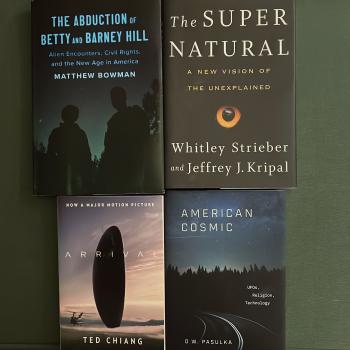Michael Card’s new book Luke: The Gospel of Amazement brought to mind memories of his music that I listened to as a teenager growing up in an evangelical church. For fans of his singing, his latest book has a supplemental CD (available separately) that is titled, Luke: A World Turned Upside Down. This initial book and CD pairing are part of a larger Biblical Imagination Series through InterVarsity Press, which includes both concerts as well as forthcoming installments by Card on the other three canonical Gospels of Mark, Matthew, and John. Full disclosure: I have not had the opportunity to listen to the CD supplement to the book.
From the book’s cover alone I was intrigued to see how Card would engage the Bible and the imagination. My spiritual direction training included a major emphasis on the Ignatian tradition — which has a strong emphasis on using the imagination to engage scripture — so I have a long-standing interest in the approach Card has chosen. In building his case for why we should engage the Bible with our imagination, Card states quite rightly that we should “bring our whole self to the task” of biblical interpretation (13). He continues that “The imagination is the vital bridge between the heart and the mind,” reminding me of a theme from the Greek Orthodox spiritual classic The Philokalia that we must cultivate ways of allowing the “mind to descend into the heart.”
Following a brief preface on his understanding of “The Biblical Imagination,” a short introduction speculating on details concerning the author of Luke’s Gospel, and an overview of “Major Themes,” the remainder of the book is twenty-four examples of Card engaging sections of Luke with his biblical imagination. Although Card is operating from a more orthodox theological perspective than I would use as a progressive Christian, I was nevertheless struck throughout that he had done his homework. Namely, almost every chapter shows evidence of studying the original languages of Greek and Hebrew and includes multiple connections between how various parts of Luke’s Gospel interrelate. Despite the strengths of these insights, I was actually surprised to find that the high percentage of scholarly commentary in the book leaves almost no room for what I would call more “imaginative” or “creative” encounters with scripture — at least as defined in the Ignatian spiritual tradition in which I was trained. Thus, on one hand, Card’s entire CD of original songs inspired by his scriptural study indicates that he has an active biblical imagination. On the other hand, I was disappointed that the book itself did not include more illumination of the imaginative process that bridged the academic study to the creative song writing.
As a spiritual director, one of my primary goals is to help others pay attention to their first-hand experiences with God. In contrast, many of us are much more accustomed to second-hand talk about God from friends, family, clergy, and teachers — and have never learned to trust and cultivate our own first-hand spiritual knowledge: what we know about God, the world, and ourselves from our own direct experience. Accordingly, I would commend Card’s book and CD to others principally as an example of someone willing to bring his or her whole self to the practice of interpreting scripture.
In his commitment to Hebrew and Greek word studies as well as to researching the historical context of scripture, Card shows us how to love the Bible with our mind. In the obvious passion and commitment of a career that to date includes thirty albums and twenty-two books — all scripturally-themed — Card shows us how to love the Bible with our heart. And in his latest original songwriting that grew organically out of his imaginative scriptural study of Luke, Card shows us how to love the Bible with our soul. However, as a spiritual director, I would urge readers to begin with reading Card’s book and listening to his CD, but not to end with the second-hand experience of how Michael Card — or anyone else — understands the Gospel of Luke. Instead, allow Card’s work to inspire you to cultivate your own first-hand spiritual experiences. Read the Gospel of Luke for yourself slowly and prayerfully, then respond creatively and imaginatively: draw, paint, dance, journal, sing — or however the Spirit leads.
I would also add that you do not have to tackle large passages of scripture at once as is Card’s habit. Leisurely dwelling over a single verse, phrase, or even a single word can provide much fodder for your scriptural imagination. Another classic technique for scriptural imagination from the Ignatian tradition is to imagine yourself as one of the characters in the biblical story and pay attention to what you notice from that imaginative perspective. In closing, allow Michael Card and other “experts” to inspire you, but also be open to how God is calling you to trust your own unique perspective, gifts, and imagination.
Visit the Patheos Book Club for more resources on Michael Card and Luke: The Gospel of Amazement.













